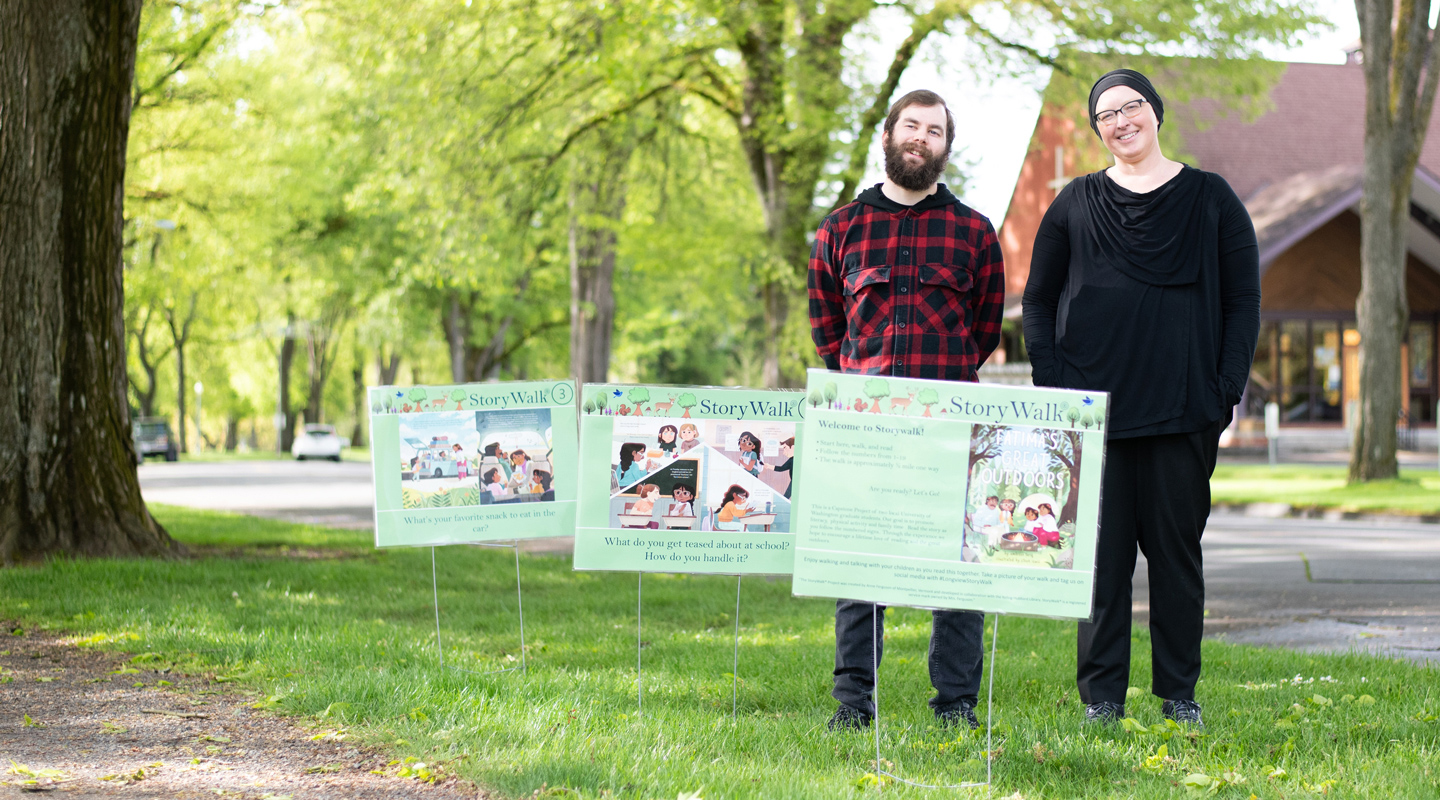With pandemic precautions and wariness lingering, Information School Master of Library and Information Science students Jakob Collins and Joanne Dallas combined reading with outdoor activity for Longview residents this year.
They implemented a StoryWalk program for the Longview Public Library, where they both work.
StoryWalks take children’s book pages, mount them to posts and install them along outdoor paths. Anne Ferguson of Montpelier, Vermont, with the help of Rachel Senechal, formerly of the Kellogg-Hubbard Library, created StoryWalk to encourage reading and being outside.
The idea has been adopted and used across the country and internationally, including by the Seattle Public Library in Seattle parks.
“I just thought it would be a really good fit for a lot of families in our area,” Dallas said.
Collins and Dallas put the boards along a trail for two weeks at Lake Sacajawea Park and outside the library, which serves 54,158 people. As part of their Capstone project, they evaluated the reception and viability of the program through online surveys and a guest sign-in book.
Approaching the program with diversity, equity and inclusion in mind, they chose “Oi Frog” by Kes Grey and Jim Field and “Fatima’s Great Outdoors” by Ambreen Tariq. “Fatima’s Great Outdoors” features an immigrant family on their first camping trip in the Midwest.
“It was really important for us to have one of the books feature a diverse child in the outdoors,” Dallas said.
It was the longer of the two stories they mounted along the paths and had at least 30 posters. Spaced apart roughly 40 paces, they stretched for about a half-mile and made a 1-mile walk, assuming people turned around when it was done.
“Oi Frog” is a rhyme book about where animals sit: mule on a stool, frog on a log, etc. The shorter story had 13 posters and stretched about a quarter-mile. Collins and Dallas chose it to encourage literacy in young children, who statistically struggle with kindergarten readiness in Longview, Collins said.
At the end of the StoryWalk, people could scan a QR code with their smartphones to fill out an online survey. It asked about how many people were in the group and their ages, their opinions on the length of the walk and the book, and their support for making it permanent.
“You’re taking action in the community instead of just talking about it.”
Or they could respond in a sign-in book with their name and comments. But it didn’t have all of the same questions, Collins said.
“When I was doing the data collection and trying to combine it all, I learned there was all this data from the digital survey that was lacking from the physical survey,” Collins said.
Their initial goal was to receive 50 total responses and at least 80 percent support for StoryWalks. They had 79 total responses that covered 125 people at Lake Sacajawea Park. There were 16 responses for 61 people at the library’s StoryWalk.
Most of the people who did the StoryWalk were adults and their children, with some seniors and teens. They liked the longer walk at Lake Sacajawea Park, according to response data Collins and Dallas collected. Respondents unanimously supported making it permanent.
Collins and Dallas had expected more children counted in the responses because the StoryWalks were near a park, playground and school. But a cold and wet February and March could have kept people from venturing out for it, Dallas said.
Becky Standal, Longview Public Library’s youth services librarian, had experience with StoryWalks at her previous job. She planned to try one for Longview in May 2020, but that was upended by the pandemic. Then the library had layoffs and program cuts, which made launching something new more difficult.
“This is exactly the kind of program we’ve been wanting to do and not had the resources to get back in and do it,” Standal said.
Collins and Dallas had to coordinate with the city’s library and parks departments to put the signs up. It was more complex at the lakeside trail because it’s on the city’s historic register, which limits alterations and additions that can be made there.
Collins and Dallas plan to ask the city’s parks and recreation board to make the StoryWalk program permanent and recommend a new site. They estimate the expense for the posts between $5,600 and $6,100, which could be covered by American Rescue Plan Act funds.
They credited courses in data science and equity over the three years they’ve spent as online MLIS students for helping them tackle the Capstone project tasks.
“You’re taking action in the community instead of just talking about it,” Collins said.
Standal, their supervisor, praised their coordination, collaboration, responsiveness and project management, and hopes to have future UW iSchool Capstone projects benefit the library.
“I’ve just been really proud of the project and the work they did, and am really glad they work here,” Standal said.
